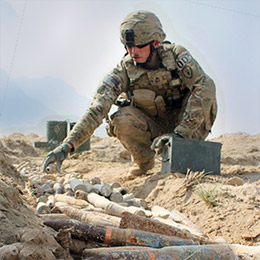Public Health
Chemical Warfare Agents in Operation Iraqi Freedom

U.S. Department of Defense
Service members who demolished or handled explosive ordinance may have been exposed to warfare agents such as mustard agents or sarin. These chemical warfare agent (CWA) exposures may cause health effects.
Health effects of exposures
Immediate symptoms and potential long-term health effects depend on the type of agent and the level of exposure.
- Blister agents:You should not expect long-term health effects after low level exposures that do not cause immediate symptoms or require medical attention, such as a small skin blister from a mustard agent. Higher level exposures such as to the whole body or airways and lungs may result in cancers or other health problems.
- Nerve agents: You should not expect long-term health effects after low level exposures with no or minimal symptoms. Learn more about nerve agents, such as sarin.
No test can confirm exposure after a few months have passed.
Chemical Warfare Agents Program
In 2015, the Department of Defense (DoD) and VA created the Chemical Warfare Agents Program for those who served in Iraq between 2003 and 2011 and were exposed to CWA. To find individuals eligible for the program, VA and DoD reviewed almost 3 million DoD post-deployment health assessments and reassessments. Then they identified and interviewed approximately 8,000 individuals from this group who served in higher risk units. Next, they identified 406 individuals who had or likely had been exposed to CWAs and had health symptoms.
The 406 individuals were offered an in-depth exam at Walter Reed National Military Medical Center. Out of this group, 324 individuals chose to receive the exam. These initial efforts were completed in 2019.
In 2024, VA offered a 5-year follow-up evaluation. Of the 406 individuals identified earlier, 338 individuals were eligible for a follow-up evaluation and 144 individuals completed the evaluation.
A preliminary review of the completed evaluations did not reveal any trends or complications associated with CWA exposure. Currently, VA is reviewing the medical charts from this group.
VA will continue to monitor the long-term health of this group.
Health concerns?
If you believe you were exposed to CWAs, you may be eligible for a clinical evaluation with a VA provider. Contact your local VA Environmental Health Coordinator or the Veterans Exposure Team- Health Outcomes Military Exposures (VET-HOME) for more details.
More research is needed
The research on long-term health effects of CWA exposure is limited. Studies of individuals with higher exposures in the 1995 Tokyo subway attack have demonstrated some long-term effects on the nervous system.
VA and DOD are collaborating to understand potential health effects.
Compensation for health problems
Veterans may file a claim for disability compensation for health problems they believe are related to exposure to CWAs. VA decides these claims on a case-by-case basis. VA presumes certain diseases are related to mustard gas after full-body exposure. File a claim online.
Learn more about VA benefits.





















